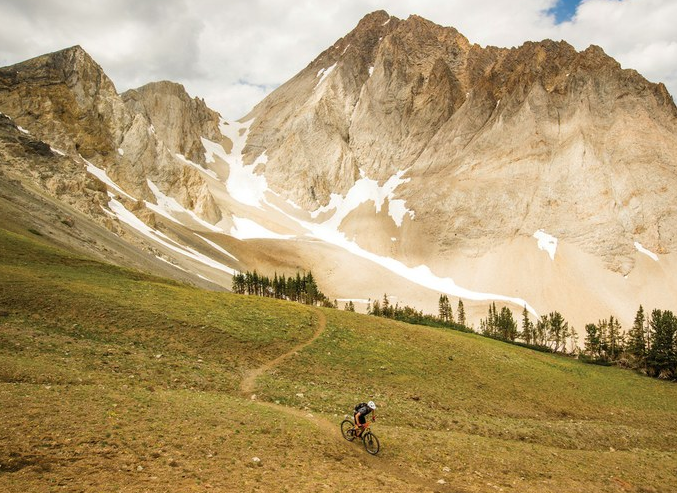Ted Stroll, a bespectacled, balding, retired attorney whose remaining hair is short and white, doesn’t fit the stereotype of an extremist mountain biker. But his group, the Sustainable Trails Coalition, is challenging the mainstream mountain biking establishment by fighting to permit bikes in America’s wilderness areas. Photo credit: Leslie Kehmeier/IMBA
A new law could change the nature of wilderness travel.
Stroll’s crusade has sparked strong resistance, particularly from wilderness advocates and environmentalists. His alliance with notoriously environmentally unfriendly Republican congressmen, whom he has enlisted to push a bikes-in-wilderness bill, is particularly controversial. Stroll’s small group has alienated would-be allies in the mountain biking community, who are loath to ostracize the greater recreation and conservation communities, especially at a time when many feel public-lands protections are taking a back seat to extractive industries.
The original text of the 1964 Wilderness Act bans “mechanical transport” — and bicycles are clearly a form of mechanized transport. For the federal agencies tasked with enforcing the ban, however, the definition hasn’t always been clear-cut.
In 1966, in its first rule on the issue, the Forest Service banned only devices powered “by a nonliving power source.” That left the door open for bicycles. Mountain bikes did not yet exist, however, so neither the original framers of the law, nor the agencies interpreting it a couple of years later, even considered the possibility of bikes venturing into the mostly roadless areas and extremely rugged trails.
In 1977, as the first mountain bikes were being manufactured — evolving beyond the earliest jerry-rigged cruisers — the Forest Service changed its rules to prohibit bikes in wilderness areas. After a couple of conflicting decisions in the early 1980s, the agency confirmed the prohibition in 1984. By that time, mountain bikes were being mass-produced and rapidly gaining in popularity. Still, the ban has stood ever since.
Now, however, that may be about to change. H.R. 1349, introduced by Rep. Tom McClintock, R-Calif., would amend the mechanized transport section ban of the Wilderness Act to read: “Nothing in this section shall prohibit the use of motorized wheelchairs, non-motorized wheelchairs, non-motorized bicycles, strollers, wheelbarrows, survey wheels, measuring wheels, or game carts within any wilderness area.” Utah Republican Sens. Orrin Hatch and Mike Lee brought similar legislation to the Senate floor in 2016.
Many environmental groups are opposed to the idea of allowing bikes into wilderness, but even some of the more permissive ones were alarmed by the congressmen carrying Stroll’s water. All three made the Center for Biological Diversity’s “Top 15 ‘Public Lands Enemies’ in Congress” list in 2017. Hatch and Lee are both standard-bearers for the federal land-transfer movement and favor opening public lands to extractive industries. President Donald Trump dedicated his controversial shrinking of the Bears Ears and Grand Staircase-Escalante monuments to the Utah senators.
Stroll acknowledges the congressmen’s records, but says that they are taking a stand based on principle. The legislators “want this corrected because it’s a wrong,” he says. “We’ve had extensive talks, and I don’t perceive that they have ulterior motives.”
The mountain bike industry’s most prominent voice for expanded access, the International Mountain Bicycling Association (IMBA), opposes the legislation, arguing that it could undercut the important relationships already forged between the outdoors and public-lands communities. IMBA has long fought against the loss of mountain bike access to wilderness areas, but has largely focused its efforts on making sure new designations don’t include popular trails. In some cases, it has lobbied for modifying existing wilderness so that trails lie outside the boundaries. The organization has worked with wilderness advocates to come up with mountain-bike-friendly compromises.
In a letter stating its opposition to the House bill, IMBA writes that collaborative efforts with Congress and land managers on future land designations are a proven way for bikers to gain or maintain access to trails. IMBA also cautioned that the legislative push could alienate the conservation community. “Public lands are being threatened at an unprecedented level, and it’s imperative that public land users come together to protect these cherished places and offer our voices in this critical dialogue,” wrote Dave Weins, IMBA’s executive director, in a letter to members describing the organization’s stance on bikes in wilderness.
Conservation groups have formed a broad coalition against what they’ve dubbed the “Wheels Over Wilderness” bill. In an open letter to Congress, 133 groups asked legislators to oppose it. A separate joint letter from The Wilderness Society, Back Country Horsemen of America and the Pacific Crest Trail Association wrote that the bill “undermines one of our nation’s bedrock conservation laws, jeopardizes America’s wilderness and won’t advance mountain biking.”
Stroll, however, remains undaunted. “The real fear isn’t that mountain biking will cause problems, but that it won’t cause problems,” he says. Stroll predicts that if the Sustainable Trail Coalition’s quest succeeds, no harm will come from biking in wilderness. Instead, backcountry access will improve for everyone, and his detractors “will be left with egg on their face.”
To read the original article in The High Country News, CLICK HERE.

 RSS Feed
RSS Feed